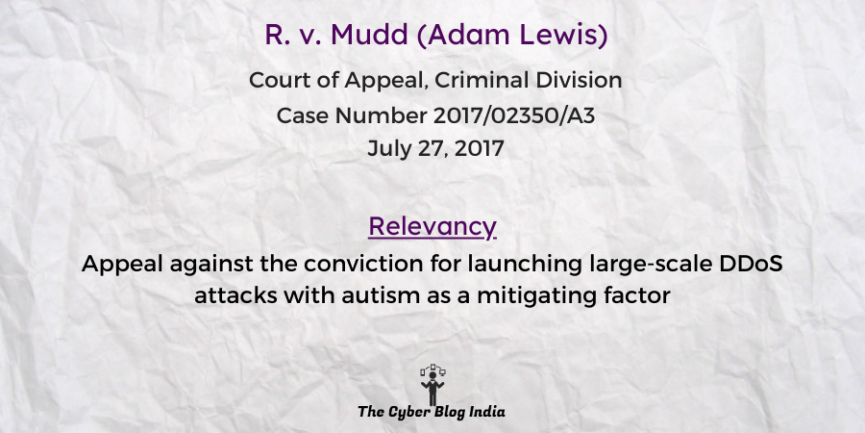R. v. Mudd (Adam Lewis)

R. v. Mudd (Adam Lewis)
[2017] EWCA Crim 1395
In the Court of Appeal, Criminal Division
Case Number 2017/02350/A3
Before Justice Lord Gross, Justice Spencer, and Judge Marson, QC
Decided on July 27, 2017
Relevance of the case: Appeal against the conviction for launching large-scale DDoS attacks with autism as a mitigating factor
Statutes and Provisions Involved
- The Computer Misuse Act 1990 (Section 1, 3(1), 6)
- The Proceeds of Crime Act 2003 (Section 327(1))
Relevant Facts of the Case
- Authorities searched Adam Lewis Mudd’s home on March 03, 2015. At that time, Mudd was 20 years old and running a DDoS program called Titanium Stresser. He created this program, sold its access, and facilitated over 1.7 million DDoS attacks.
- Searching Mudd’s computer and phone uncovered significant evidence, including databases and transaction records.
- Mudd admitted to creating the Titanium Stresser and launching some attacks himself. He made a significant profit, earning around £248,000 from his activities.
Prominent Arguments by the Counsels
- The appellant’s counsel argued that:
- His autism diagnosis reduced his culpability. The counsel highlighted the appellant’s young age at the time of the crime and his lack of a criminal record.
- The counsel further proposed a suspended sentence with a rehabilitation program by elaborating on the severe impact jail time could have on the appellant.
- The prosecution’s counsel argued that:
- The appellant’s DDoS attacks operated vastly and had a severe impact. He used sophisticated methods to hide his financial transactions.
- Considering the global impact of the offences, he argued in favour of a prison sentence.
Opinion of the Bench
- While the offences had a global impact, the appellant’s autism is a reasonable mitigating factor.
- However, considering the significant financial gain and sophistication involved, a custodial sentence is necessary to address the seriousness of the crimes and the appellant’s responsibility.
Final Decision
- The court upheld the Trial Judge’s sentence of immediate custody in principle but substituted the original 24 months’ detention with 21 months’ imprisonment in a young offender institution.
